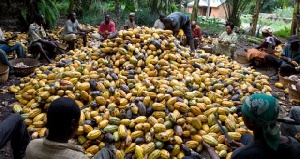Cocoa farmers in the Assin Fosu hub of the International Cocoa Initiative (ICI) have said the international NGO’s support, aimed at improving their livelihoods, while eliminating child labour in their communities, are paying off.
The representatives of the farmers told journalists, at a media training programme, that the awareness and educational programmes in their communities had resulted in keeping children in the classrooms during farming hours, thus pushing school enrolment levels high.
They said the lessons they had been receiving from ICI-supported Agricultural Extension Officers had improved their agronomic practices for increased yields; and their rice and vegetable farms, which they had cultivated as alternative livelihoods, were bringing in off-cocoa season incomes.
Additionally, they said, ICI last year, withdrew 18 teenagers, who were at risk of child labour,i from their communities and was sponsoring them to understudy various vocations at Assin Fosu. The beneficiaries also receive a monthly stipend of GHC80.
The journalists engaged the farmers, who were from six communities, including Assin Dasii, Abease, Akrofuom, Ninkyiso and Nsuekyir, to learn from their successes and challenges, as part of an ICI organised training programme, to better understand issues of Child Protection to be able to lend their effective support to the cause.
As part of its strategies to eliminate child labour in cocoa the industry, the ICI has since 2015, been assisting the farmers to form Community Child Protection Committees, Income Generating Groups and Community Service Groups to develop home-grown solutions to ensure that their children developed into healthy, well-educated productive adults.
The international NGO also provides farming inputs, social amenities and other pro-poor solutions to the most vulnerable communities.
Mr Okyere Bugyei, the spokesperson for Akrofuom, said they had been using their Child Labour Tool Kits to educate parents on the need to prevent their children from engaging in hazardous activities, including the inhalation of smoke and agro-chemicals.
They had also been going to the schools to monitor attendance and to educate the children on the need to complement the protection of their rights by honouring their responsibilities to study hard and be disciplined.
“ICI has empowered us to improve our standard of living; we now know how to keep proper account of our incomes, our children are given educational materials, we receive farming inputs, and our wives are now engaged in income generating activities,” Mr Bugyei said.
The Akrofuom community used to record an annual average of six pregnant candidates during the Basic Education Certificate Examinations, but because of the child protection advocacy, this year, Mr Bugyei said, no pregnancy was recorded.
“The evidence is out there on the streets, we are all happy, and our marriages are thriving,” he said.
For his part, Mr James Kwofie, the spokesperson for Abease, said the Community received the Best Community Farm Award at last year’s Regional Farmers’ Day, while their women won the Regional Award for Best Female Rice Farmers.
All the representatives said they were earning appreciable incomes from their activities as Community Service Groups, which included the levy they charged for weeding people’s farms.
This academic year, ICI provided 87 children in the Assin hub with school uniforms, foot wear and educational materials and enrolled many in schools.
The farmers applauded this support, but appealed for more to cover more children.
The journalists are expected to follow up their training with field trips that would give firsthand information to make recommendations for the relevant interventions by governmental and non-governmental actors in the best interests of the affected children.
They were schooled on Child Labour, Causes and Consequences of Child Labour, Worst Forms of Child Labour, Hazardous Work and the efforts being made by Government and other stakeholders to achieve positive transformation.
Child labour is ‘any work that deprives children of their childhood, their potential, their dignity and undermines their physical and psychological development’.
The Worst Forms of Child Labour include, Child Trafficking, Commercial Sex, Exploitation of Children, Child Domestic Servitude, Carrying of Heavy Loads and Street Hawking.
According to the latest edition of the Ghana Living Standards Survey, 1.9 million children in Ghana are engaged in Child Labour; with 1.2 million in Hazardous Labour.
Worldwide, reports say 101 million children are engaged in Child Labour in Agriculture alone, with 35 million in Africa and 2.1 million being in Ghana and Cote d’Ivoire.
Business News of Monday, 23 October 2017
Source: ghananewsagency.org

















